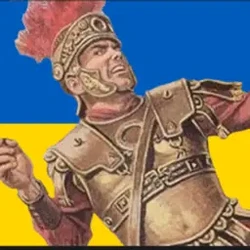I am soo glad that NFTs quickly died out.
They were killed by metaverse which was then killed by AI.
Actual cool tech like VR got wounded pretty bad in the process tho.VR is still a solution looking for a problem.
You never played Half Life Alyx I guess
I haven’t but of course I’m aware that VR gaming is a thing. My point is that VR has been touted as the “next big thing” for decades but still isn’t more than a curiosity for the average person. There is still no “killer app” in sight that might change that.
Vr in pass thru mode is what the future will look like.
Half Life Alyx for one of the coolest games I’ve ever played story and mechanics wise, things like Blade and Sorcery are hands down some of the most run I’ve ever had playing games.
You want to feel cool? Jump from a ledge and land on a golem’s back, panic-drop your dagger, grab the hatchet at your belt and bash the golem’s crystal, rolling away from his tantrum. And that game doesn’t even HAVE a story (it does…but it doesn’t)
That doesn’t even bring up any of the cute platformers I’m less keen on, or the various exercise-type games disguised as fighting (i love you, Rumble).
I don’t play VR exclusively, hell it makes up less than a fifth of the time it spend on games as a whole, but damn if it isn’t the most engaging medium for me.
uses for VR:
Gaming, mostly gaming
horny Furry hangout (VR chat)
Some 3d design processes are easier in VR
Porn
Horny Furry Hangout?
Sold!
First person shooters and boneworks.
Large scale Construction.
Companies can save millions in redesign costs by spotting problems before they are built.
Why do you need VR for it, and not just explore it on a cheap screen?
If you are a civil engineer with excellent spacial visualisation and familiarity with the 2D IT tools (e.g. Autodesk), then VR doesn’t add much.
But for everyone else, the VR interface is like inspecting the completed project, and interaction requires only a very small learning curve.
VR is a game changing client UI tool for the construction industry.
The fact that most everyone conflates NFTs with shitty pixel art is a result of purposeful brand sabotage of technology that could have revolutionized democracy had it been given the chance to mature before the underlying tech was dismissed as a joke instead of a tool.
I think I know where you are going with this, but please explain your point about how NFTs could benefit democracy.
Verifiable, tamper-proof identity.
A core democratic problem is identity verification, proving one person = one vote without exposing private data. NFT-like cryptographic tokens could serve as self-sovereign digital IDs: issued once per citizen, cryptographically unique, and impossible to counterfeit. Unlike centralized ID databases, these would live on public blockchains — auditable, portable, and resistant to authoritarian manipulation or “ghost voters.”
Result: Transparent voter rolls, secure remote voting, and disenfranchisement prevention without needing to trust a single government-controlled database.
Transparent, auditable voting systems
Instead of ballots locked inside opaque government software, votes could be cast as time-stamped, anonymized NFTs, each representing a verifiable choice tied to a unique citizen ID token. The entire election could be publicly auditable in real time without revealing individual votes.
You could mathematically prove:
that every registered person voted once,
that their vote was counted,
and that totals were not tampered with.Result: Radical transparency and trust restoration in electoral systems.
Direct, ongoing participation
Democracy often stagnates between elections. NFTs could enable continuous micro-governance: Citizens hold governance tokens (not speculative coins, but non-transferable “participation NFTs”) that let them propose or vote on local policies, budget allocations, or community initiatives directly. Smart contracts could automatically enact results, cutting bureaucracy and ensuring accountability.
Result: A living, participatory democracy, not one that only awakens every four years.
Civic ownership and accountability
Public assets — from infrastructure projects to environmental credits, could be represented as NFTs tied to shared ownership. Citizens would literally own a verifiable stake in public goods. This could link taxation, policy, and transparency in new ways: if a public project fails or funds are misused, the token ledger shows exactly where accountability lies.
Result: Citizens become shareholders of their government, not subjects of it.
Culture of transparency and provenance
NFTs create permanent records. Not just for art, but for laws, political promises, and government spending. Imagine every campaign promise, policy draft, and legislative vote minted as a verifiable public record, impossible to “memory-hole.” The historical record of governance would be immutable, traceable, and publicly accessible forever.
Result: Institutional memory and transparency that can’t be rewritten.
In essence
NFTs, stripped of the hype and speculation, are about trust without central authority. Applied to democracy, they offer a framework for identity, accountability, and participation that is verifiable by math instead of by power. That’s why silicon valley went out of its way to make them into a joke, and judging by how reviled my comment was, here of all places, they were clearly very successful at it.
Soo e-voting?
No.
Just no.
E-voting is and always will be a terrible idea.
A democratic system fails if you can’t have voter secrecy, which is impossible with electronic voting.
I understand where you’re coming from, but millions this last US election cycle don’t even know if their vote was counted. Transparent voting is the only way to restore confidence in the democratic process and ensure that there’s no tampering on either side.
Voter fraud in most countries is a solved problem. Doesn’t mean we shouldn’t innovate, but it does mean that everything you posted is a solution in search of a problem.
Honestly, I feel like this is part of a profoundly anti-social wave of throught that has been manifesting lately. It’s the same breed of ‘I can’t trust anyone’ that results in preppers - it’s just that some recognize that functioning water treatment plants are good to have. The lack of trust in communities and traditional governance is a bit… alarming, honestly.
Voter fraud in most countries
Most countries
Cool story, bro.
What happens when I lose my key in a flood or fire?
Then recovery depends on social trust instead of blind authority: multi-party recovery, community validation, or decentralized custodians could restore access without any single entity holding power over you.
So, exactly the same way as the current system of presenting identity documents at a local government office.
Edit: and before you take the time to write up an essay explaining what a web of trust is, I implore you to actually learn how our current system works. It’s not a central authority, it is already a web of trust.
Local ID systems are a web of trust, but only within a single jurisdiction. Blockchain identity aims to make that trust portable, interoperable, and resilient to failure. It’s not about replacing government offices but about ensuring verification still works when the local system is gone, corrupted, or inaccessible.
How could NFTs revolutionize democracy?
I answered this more thoroughly further up, but to put it concisely, NFTs could revolutionize democracy by creating verifiable, tamper-proof systems for identity, voting, and governance. They could enable self-sovereign digital IDs for secure elections, transparent public ledgers that make every ballot and budget auditable, and non-transferable governance tokens that let citizens participate directly in decision-making. Even civic assets could exist as shared NFTs, turning taxpayers into actual stakeholders in their communities. In essence, NFTs could shift democracy from trust in authority to trust in transparency.
voting
No. NFTs are traceable, and key to democratic elections is the anonymity of the vote.
You could screw democracy by relying on this. You cannot anonymise NFTs, because the traceability is a key and defining feature of all things blockchain.
I understand where you’re coming from, but millions this last US election cycle don’t even know if their vote was counted. Transparent voting is the only way to restore confidence in the democratic process and ensure that there’s no tampering on either side.
You are so off. “Transparent Voting” is a tool for autocrats and dictators to pressure people’s votes and punish dissidents.
In Germany, everyone can volunteer as an election worker, votes get counted multiple times etc. We don’t have a problem with lacking confidence in this regard.
If you want “transparent voting”, ask Russia.
What I’m describing isn’t transparency of individual votes, but of systems: a public, auditable record that proves votes were counted correctly without exposing identities.
The goal isn’t to replace systems like Germany’s, but to extend trust where it’s currently broken. Places where citizens can’t volunteer, ballots disappear, or results are unverifiable. It’s not about seeing into votes; it’s about ensuring no one can alter them unseen.
No, it was always a joke with no real use purpose.
Only a sith deals in absolutes 👀
yeah but how can you apply monetary value to something you can duplicate by pressing print screen?
Yeah, that use case is stupid, but that’s not what NFTs are. That’s the conflation I’m referring to.
Copium.
Lol? What is it you imagine I’m coping with?
Having bought a monkey .jpg and coping about losing thousands of dollars, clearly.
Sure, Jan.
Oh hey, a wild PhilosophyTube reference! Go check out their channel. If you like this kind of wit, you’ll find it incredible.
Just don’t look up her history with contrapoints if you still want to enjoy the channel
The skinwalker actually has talent.
I don’t have twitter, but that Diogenese comment deserves cake
It’s a shame that NFTs were immediately used for speculation.
The applications for things like E-Tickets was really cool! No third party required to trade and proof of ownership is self evident.
The technology will continue to develop in the background, more slowly, but steadily. Once society is ready to use it for something other than rabid speculation, it will be ready I suspect.
I think one of the early macabre fantasy writer had a short story about a carny who was selling shadows to some geeks and then he got got and it wasn’t pretty.
If you gaze long into the pump’n’dump, the pump’n’dump gazes also into you
*Gazes into you and pump’n’dumps* :3
I member when they wanted to add this complicated solution to an already complicated process (making videogames).
Truly the machine spirit of middlemen.
What is the intrinsic value of a piece of paper? Money is a social phenomenon.
Money is a slice of the gdp.
Money is a social phenomenon
Perfectly explains why NFTs don’t work. Nobody believes in the value of some bits on a blockchain, so it has no value.
Well some people do. And when some people believe a thing against all reason, we call that a cult. If they get big enough it’s a religion. I worry about the future of the techno priesthood.
Odd, there’s a significant part of the world population that doesn’t believe the Canadian paper money I have has any value and will demand payment in their local paper. Does Canadian money have value?
You’ll find this question already answered in the comment you replied to.









